…for many of us, these spaces are what have kept us alive. In a world that demands its inhabitants to be a certain way, think a certain way, or live a certain way, we gravitate to the spaces that say: Welcome. Be yourself. For the tormented queer, the bullied punk, the beaten trans, the spat-upon white trash, the disenfranchised immigrants and young people of color, these spaces are a haven of understanding in a world that doesn’t understand — or can’t, or doesn’t seem to want to try.
– Gabe Meline, “It Could Have Been Any One Of Us,” kqed.org
By now you’ve heard, of course, about the Friday night fire that ravaged a show at Ghost Ship, an artist collective in the Fruitvale neighborhood of Oakland. You’ve heard that the fire killed at least 36 people, and how that number is expected to rise as responders continue searching the building. You probably also know that they died inside a 9,900-square-foot warehouse with a narrow staircase from the first to second floors that artist Josh Howes described as “literally made out of kindling.”
Here’s what else we all know.
Somewhere between 18 and 25 artists lived and/or worked there. These artists were people determined to keep the Oakland alternative scene alive amid skyrocketing rents and gentrification pushing out low-income families, longtime residents and struggling artists in favor of wealthy Silicon Valley tech workers. The warehouse space, cluttered with antique furniture, speakers, pallets, instruments, art projects, pianos and other found objects, was not zoned for residential occupancy, did not have operating sprinklers, and had not obtained an event permit. It has been described as “a tinderbox” and “a labyrinth.” One former resident calls it a “death trap,” and recalls paying $700/month to live there — which’s pretty cheap, by Oakland standards, where the average rent for a one-bedroom in 2015 was $2,190.
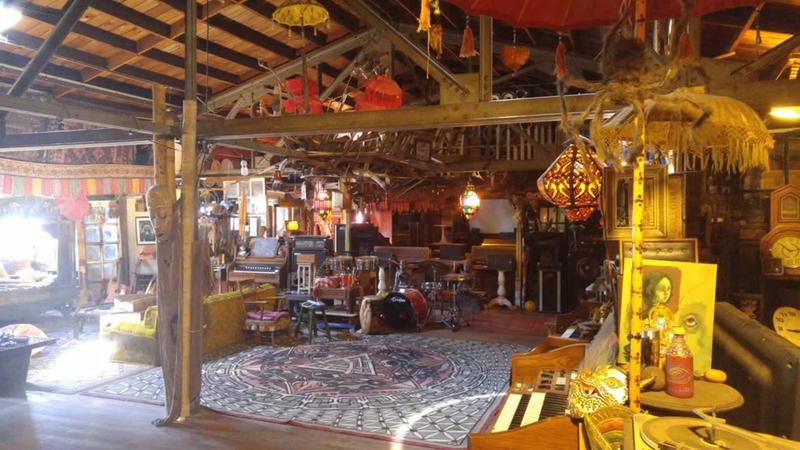
A room in Ghost Ship
The show was part of a West Coast Tour involving artists from 100% Silk, a Los Angeles based dance-music label spin-off of the experimental Not Not Fun label. Three 100% Silk artists performed along with local musicians not on the label. Two 100% Silk artists, Chelsea Faith aka Cherushii and Johnny Igaz aka Nackt, are said to have died in the fire. The third, Joel Shanahan aka Golden Donna, made it out alive.
100% Silk directors Britt and Amanda Brown did not book the venue directly, according to LA Weekly. Amanda told the paper she assumes one of the Bay Area artists had chosen the space, and “stressed that artists such as Golden Donna primarily play unpermitted DIY spaces not by choice, but out of necessity.” Basically: these artists have intense followings, but they can’t book mainstream venues. So this was a show for outsiders — queers, punks, goths, you know.
…we meet in warehouses. Where we can just love on each other and escape from all the scariness and sadness. We take care of each other in our unsafe spaces that can feel so much safer than your safest spaces.
Imagine you were on a sinking ship. And there is only one lifeboat. And someone screams that there is a chance the lifeboat might tip over.
You’ll take that chance….
We’re not trying to put each other in danger. We are trying to save each other’s lives. We love each other so much.
-Kimya Dawson, musician, via Facebook
This is why, then, there was no event permit or residential zoning. Warehouse parties and other underground events have been “a central part of Oakland for decades,” Nihar Bhatt, a DJ who survived the fire, told The Guardian. He explained how spaces like Ghost Ship “are particularly vital for LGBT artists and people of color often excluded from the mainstream industry.” Specifically, “there’s a movement in Oakland of experimental black and brown and queer people who don’t necessarily want to be in a bar or a club.” One of Friday night’s performers, Russell E.L Butler, was an experimental artist/DJ whose music “draws from a rich cultural of history rooted in their island and the black, queer diaspora.”
The residents and artists and musicians who lived or worked or visited Ghost Ship knew that seeking relevant permits and commissioning inspections would lead inevitably to eviction. The city would sell the building to real estate developers, it’d become market-rate housing, and the punks who sought refuge in Ghost Ship would have one less place to be themselves. “If you can’t afford to buy a million-dollar home, then you can’t afford to live in this city unless you’re willing to risk your safety,” housing rights activist María Poblet told The Guardian, “And that’s unconscionable.”
It is unsurprising and heartbreaking, then, that the list of the confirmed dead includes members of the LGBT community. On 48 Hills, Marke B., who’d been to similar shows, describes the dead and missing people as “denizens of a tight-knit scene, much of it queer and of color, that nourished itself on DIY dedication and a true family spirit.”
In an early report, CNN said that members of the transgender community were assisting law enforcement in identifying victims. At this point, at least three trans women have been confirmed dead.
22-year-old Cash Askew, a member of the band Them Are Us Too, came out as transgender and gender nonconforming about two years ago.
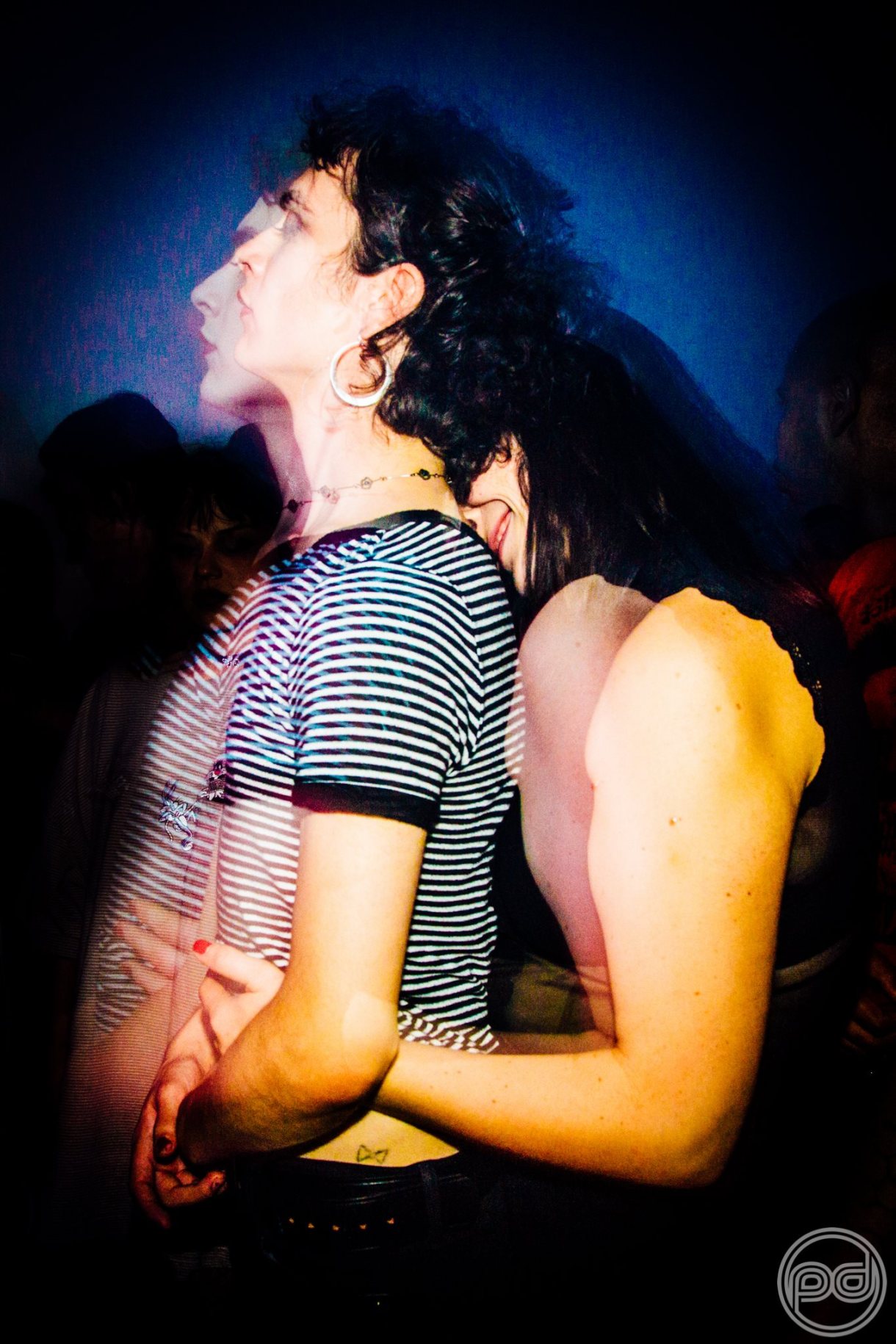
photo of Cash Askew & Anya Taylor by Alex Brown
She grew up in the Bay Area and always felt drawn to the underground music scene, eventually becoming a part of it as a DJ and guitarist. She is survived by her girlfriend, transgender musician Anya Taylor of Petheaven, who posted on her Facebook wall this past weekend, “My love is gone. Nothing is real. All I want is her.” A friend who knew both women said she’d never seen Cash as happy as she was after meeting Taylor.
Dais Records, Askew’s label, issued a statement on her death, which included “She was loved and admired by everyone she met, and her passing is an excruciating loss that we may never fully process or recover from.” In an interview with Bitch earlier this year, Askew said, “As a young teenager I was definitely attracted to goth and new wave in part because of the androgyny, and that aesthetic gave me a way to explore my gender expression before I could even come to terms with being transgender.” Askew’s mother, Leisa Baird Askew, told The Washington Post that Cash grew up in a “very musical family, very artistic family, very queer family.” Cash’s stepfather was a manager at The Lexington Club, the city’s last lesbian bar, and Cash would hang out there as a kid.
Cash and Anya were also friends with another trans woman who was killed in the fire, 29-year old Feral Pines.
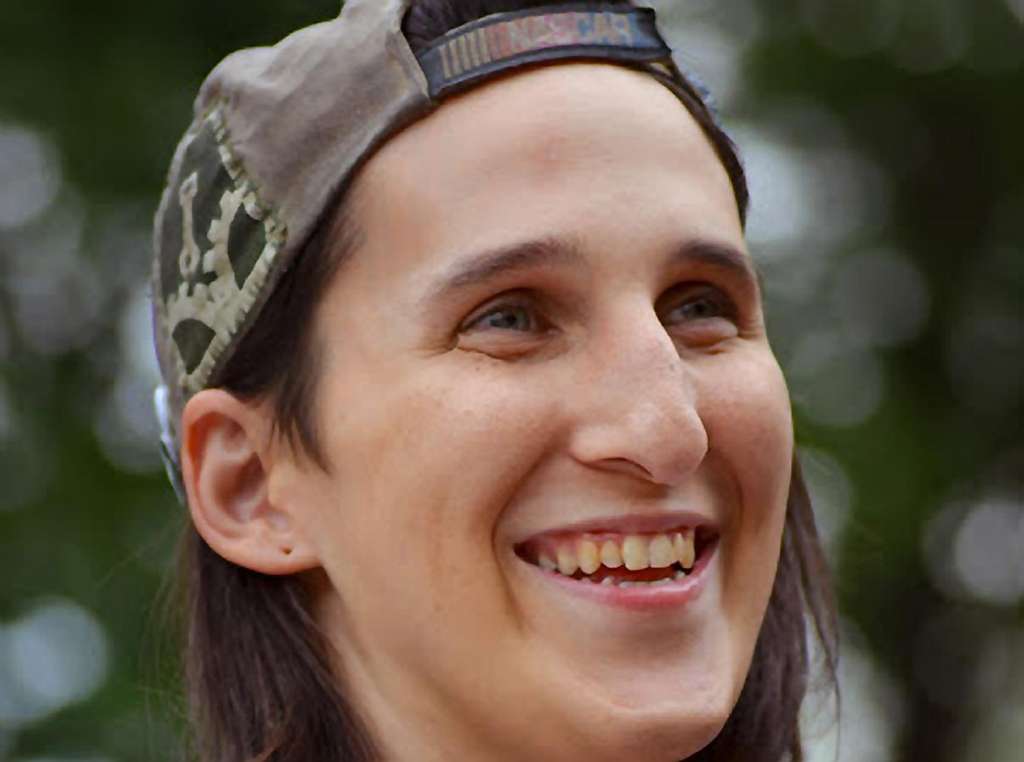
Feral Pines via The San Francisco Gate
Her father, Bruce Fritz, says she used to play bass guitar in local bands before leaving Connecticut for the School of Visual Arts in Manhattan and then to Indiana before making the move to Oakland three months ago. Her brother told The Los Angeles Times that she’d been happier than she’d been in a long time since the move to Oakland, and was building a new life for herself there. “She’s one of the gentlest and sweetest people I ever knew,” her brother said. “She’s extremely intelligent. I considered her very brave. Life isn’t easy for transgender people, but she followed her path and was true to herself.”
33-year-old poet, barista and baker Em Bohlka was another transgender woman confirmed dead.
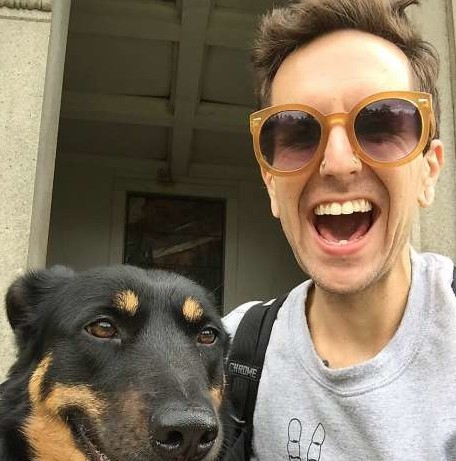
Em via The San Francisco Gate
Her ex, Natalie Jahanbani, described Em as “the best person in the world.” Em began presenting as female earlier this year, moving to Oakland after getting a B.A from UC Riverside and a master’s degree in literaure from Cal Poly Pomona. “I really want to express my support to Em and to all the transgender community,” her father told The San Francisco Gate. “I know that’s what Em wanted.” Em had gone to the show with Donna Kellogg, her co-worker at Highwire Coffee Roasters in Oakland, who also died. Em liked to garden, take pictures, and walk her dog along Lake Merritt.
Two of the missing cis women have also been described as queer by people who knew them on social media.
Ara Christina Jo was an illustrator and designer who co-organized the East Bay Alternative Book and Zine Fest and Emeryville gallery space Sgraffito.
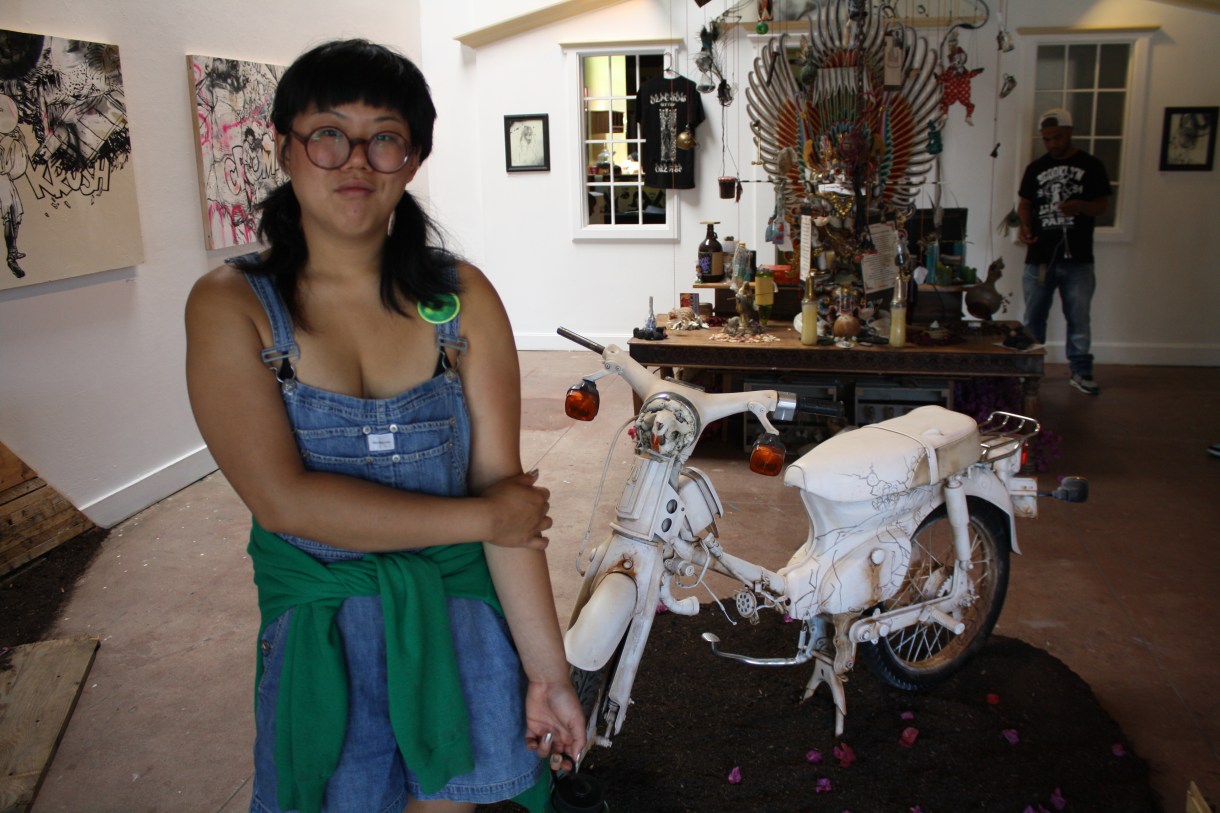
photo via felix the third rock
Previously she worked as a volunteer and Gallery Director at the kickass Rock Paper Scissors Arts Collective, a venue, classroom space, gallery and zine library in Oakland. Her design work includes fliers for legendary Oakland dance party Hella Gay. She’d gone to the show to spread information about Dakota Access Pipeline fundraisers she was organizing. She is survived by her partner, Zack Dewane. “She’s an incredibly energetic person, who can cheer up a room just by existing, a lot of energy packed in that small body,” said one of her co-workers at The Ink Store.
31-year-old Jennifer Kiyomi Tanouye often set up her pop-up nail shop at events like these, and that’s what she was doing at Ghost Ship on Friday night — working her Underground Nail Bar on the precarious second floor of the warehouse.
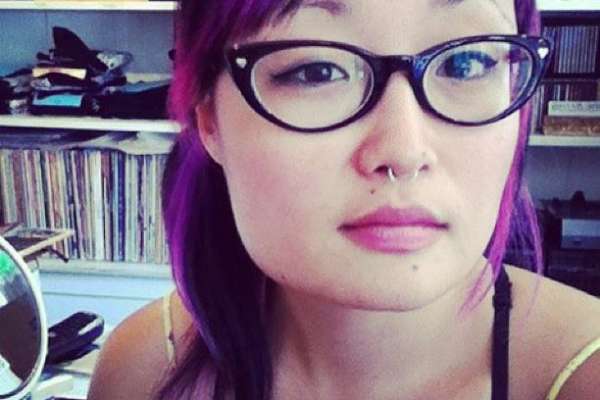
Tanouye was a music manager at Shazam. Her best friend Ronnie Casey told The East Bay Times that “she was a light. To know her was to love her.” Tanouye worked at one of my favorite stores in Oakland, Issues, a book & magazine shop in the Piedmont neighborhood, as well as at the Exploratorium in San Francisco. She ran the Mission Creek Oakland Music and Arts Festival, and in 2012 was credited by The East Bay Express for helping to make Oakland an arts destination. Another close friend told The San Francisco Gate, “she was always really helpful. Any time a friend had an emergency, she was just the kind of person you could call.”
These are not the only victims who had ties to the LGBTQ community and they’re probably not the only LGBTQ people we lost Friday night. These are the names of those currently listed as missing or dead. If you are aware of any of the women on this list being lesbian, trans or otherwise-queer-identified, please let me know.
- Cash Askew
- David Cline
- Nick Gomez-Hall
- Sara Hoda
- Travis Hough
- Donna Kellogg
- Feral Pines
- Brandon Chase Wittenauer
- Jonathan Bernbaum
- Joey Casio
- Barrett Clark
- David T. Cline
- Micah Danemayer
- Chelsea Faith Dolan
- Alex Ghassan
- Ivania Chavarria Gonzalez
- Michela Angelina Gregory
- Johan Handel
- Johnny Igaz
- Chase (Nex) Igulo
- Ara Chirstina Jo
- Alana Kane
- Viktor Kastro
- Amanda Kerhsaw
- Edmond Lapine
- Madison Machado
- Griffin Madden
- Jason McCarty
- Jenny Morris
- Denalda Nicole Renae
- Vanessa Plotkin
- Hanna Ruax
- Ben Runnels
- Jennifer Kiyomi Tanouye
- Alex Vega
- Pete Wadsworth
- Nicholas Walrath
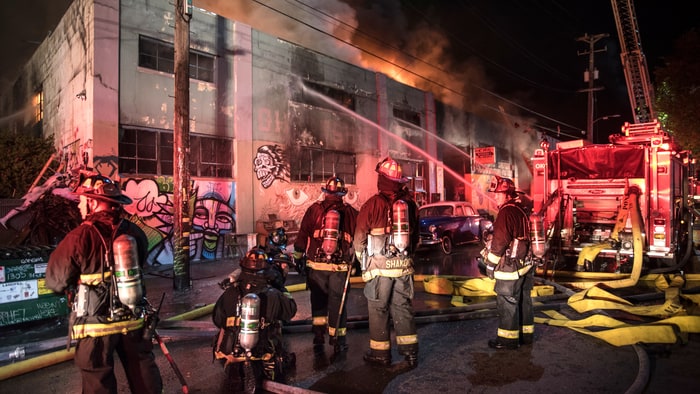
Firefighters battle the blaze on Friday night, via Rolling Stone
Here’s another thing: Despite being an underground, off-the-grid situation, it seems Ghost Ship was not without its own patriarchal power struggle. Derick Ion Almena was the building’s “master tenant,” and he lived there with his wife, Micha Allison, and their three young children. (Social services had taken the couple’s children from the home in Spring 2015, but they had been returned to their family in June.) Allison’s father told ABC 7 that the two had a “troubled relationship” and that when her family sent Allison to rehab last year, Almena talked his way into the facility and convinced her to check out. According to The New York Times, Almena “lured” tenants to the space by promising a creative Utopia and very cheap rent, but they often weren’t warned about its sporadic electricity and lack of heat or about Almena’s practice of bringing in homeless people to harass residents he felt had wronged him. According to Amplify, Almena “allegedly ignored repeated safety and fire warnings about the building, which had no sprinklers or smoke alarms.” Von Magius, who identifies himself on Facebook as a former resident, says he offered to rebuild the stairs and a backdoor, only to see Almena spend the money raised for these efforts on drugs. “…Derick built this death trap and threw parties when no one lived there but him and his family,” Von Magius writes. “Please do not excuse this man nor his neglect.” Another former friend of Almena’s told The San Francisco Chronicle, “Multiple people warned Derick that it was a death trap. He would laugh it off. This tragedy could have been avoided if it were not for his arrogance.” He has been on probation since January for a felony of “receiving stolen property.” This morning he appeared on the Today show for a tense interview.
Favianna Rodriguez, the co-founder of the Eastside Arts Alliance, posted on Facebook about the misconception that “underground spaces = unsafe spaces.” “Let’s be clear that the deathtrap venues are run by cis white men,” she wrote. “Spaces run by queer, POC, women and the sick and disabled community regularly consider questions of safety.” She encouraged people who run these spaces to get to know their local community, and to listen when safety issues are pointed out by visitors or residents of the space, declaring, “When community art spaces work hand in hand with the community, safety in its full form becomes a natural priority.” On Medium, a writer familiar with spaces like these posted a guide to making them safer.
This tragedy comes at a particularly difficult time for the LGBTQ community, following the Pulse Nightclub shooting in June and our recent election of the Worst Man In The Entire World to the Presidency of the United States. We need safe and accepting spaces more than ever.
“This was not a rave, or an empty-headed dance party, not a place people came to consume. This was a show, part of a vital and important underground world. The stakes are different and the connection level is intense. You want to talk families? These are chosen families. People with very little in common with the family they are born to, or choose to make their lives based on shared interest and values.”
– Conan Neutron, Musician, The Huffington Post.
Diverse groups of marginalized humans have been gathering and dancing with other weirdos in Oakland warehouses since the early 80s, and in September, The East Bay Express did an extensive story on how the Bay Area real estate market is making these spaces — known for hosting “after-hours raves, punk shows, hip-hop dance parties, noise performances, visual art exhibits” — go extinct. In July, 13-year-old West Oakland artist collective LoBot saw its rent double and its lease discontinue. Liminal, another West Oakland warehouse space — home to The Living Room Project, which “hosted events such as dance performances and yoga workshops for queer and trans people of color” — evicted dozens of tenants when the city determined it “uninhabitable.” In prior decades, a new space would pop up as soon as an old space went under, but this real estate market is making even that eventuality an impossible one.
Queer musician Aja Archuleta had set up her equipment and was working the door at Ghost Ship when the fire broke out. She managed to escape, but feels the loss of her family acutely. She told Vice: “An entire community and family of musicians, artists, queers, and community organizers were in that building. Some of the purest and most amazing souls I have been blessed to know in this existence helped organize that event last night.”
The Trans Assistance Project is raising funds for the funerals of the trans women killed in the fire. You can donate here. Please let us know in the comments of other fundraisers that need our support.



Thank you for paying tribute to these amazing humans.
This is indispensable journalism; thank you for writing. I’ve been particularly devastated since I heard about the fire on Saturday, and it’s for all the reasons you and others have described. These spaces are integral and so familiar to us… I know exactly what it’s like to go to a warehouse party, and house parties with questionable setups. I’ve gone to them because they are places where if a guy is harassing me, I don’t have to convince the management to throw him out. I can just tell him to leave me alone and everyone else around me will have my back. They will do the work for me. It’s not like a club or a bar- the feeling of being among family is so much stronger. These are also places where you can be free to play whatever kind of music you like. I’ve seen artists set up their equipment on makeshift stages made out of stacked milk crates and cardboard and absolutely bring the house down. It’s about more than being or trying to look cool. Underground art is vital, and that entails underground spaces, structurally sound or otherwise.
I was reading comments on something about the Oakland fire and someone wrote about a what ‘a typical day looks like’ for underground Bay Area artists. They’ll leave the $3000/month two-bedroom apartment they share with seven other people and go to work at a bookstore/university/restaurant/retail store/screen printing shop/coffee shop, etc. and then upon finishing their shift, they’ll head to their studio space in one of these warehouses. If sleeping on one of the two pullout couches in the living room in their shared apartment gets old, they might move into the studio space. Either way, they’re paying somewhere around $400/month in rent just to have this life. Just to be able to do art in a place that welcomes and affirms them.
I also love that you included commentary about how these particularly dangerous collectives are often run by cis white men. Derick Ion is a world-class POS, as evidenced so plainly by what he posted on facebook the night of the fire.
Two years ago in Lincoln, Nebraska, our main gay bar burnt down one night in the middle of winter. It was an electrical fire, which makes sense because the building itself was old as hell. But a few months later, it was paved and turned into a parking lot used for football tailgating. I couldn’t think of a more biting example of the white supremacist heteropatriarchy encroaching on a previously racially diverse, queer space if I fucking tried.
Thank you, as always, for writing. I hope you never lose the spirit that drove you to create this site. Even though it’s online, this place is similar in terms of community to an underground art collective.
!!!
I don’t know or care what Almena’s race is, but he does not appear to be white.
Oh yeah, so he is just a cis man. Still indicative of the problem with these kinds of unsafe venues/living spaces. I think somewhere in the article it’s mentioned that places run by people with intersecting identifies regularly make safety a top priority, but Derick Ion never did. And now he’s nowhere to be found- who knows whether or not he’ll be held accountable?
Ah wait ok, he IS around. I haven’t checked the news in a day or so. Jesus…
But also like, why is that half of what this comments section is focusing on? He was a bad guy. Truly. He raked in somewhere around $10,000/month from these people and only had to give the landlord $4100 of it. I read that in a CA newspaper, and I can get you the source if you like. A lot of people suspect that the city was being paid off as well, otherwise the place would have been deadbolted years ago.
Also, the night of the fire he posted on facebook about how “everything he worked for is gone,” but made no mention of the dozens of lost lives. The terror his tenants must have felt choking on smoke while him and his family were safe in a hotel. You know, people he collected rent money from so he could heat their showers with propane tanks and build some rickety pallet-stairs and NOT take the bars out of the upstairs windows or build fire escapes. Money he took and did who knows what the fuck with instead of installing a sprinkler system.
Fuck!!! He was on Good Morning America and he tried to make this about how he thought he was doing something directly for the gay community, for young queer artists, for people in poverty. Like he was doing us a fucking favor by not making the building as safe as possible! What a piece of shit, oh my god
Dear Chelsea
There are old straight white men who care for all good hearted folks—ALL! This lovely article, sent by my most beloved sister, Shemaia, followed many exchanges re thus unspeakably horrible tragedy and how too many don’t have a clue—even if interested—how precious these kinds of living expression ‘safe’ spaces are for counter culture humans desperate to live & love & create & thrive freely–
Your comments had tears flowing down my face, which just kicked in again, as it helped me appreciate even more profoundly what Shemaia & I were sharing & wishing others out in normality-land cared to better grasp, better understand, better support. Bless your heart. Please pass that along.
Bill Hoover
[email protected]
Thank you for this lovely tribute.
I hung out on the fringes of a similar scene in Chicago in the 90s and I’ve been thinking about that a lot since hearing about the fire. It was a pretty important part of my coming of age, although I’m not sure I felt much more at home in a lot of alternative spaces than I did in more conventional spaces. Which maybe had more to do with me than the spaces.
But I am thankful that those spaces existed and continue to exist and I grieve and honor the loss of everyone at the Ghost Warehouse fire.
Too close to home. I went to college in Oakland and one of the victims was a classmate (I didn’t know her, she was a friend of a friend). Oakland is such a great place, despite how it’s portrayed in the media. I hope that some good can come out of the tragedy. These artist spaces are important, but safety is even more important.
Thank you for this. My friend Chelsea is among those lost, and knowing so many who are dealing with the loss of multiple beautiful souls is just staggeringly heartbreaking. I can barely deal with it from where I am in this nationwide connected community of electronic music artists. I’m not sitting right there in the middle of a community whose heart has had a hole torn in it.
My love and condolences to all those bearing this loss. I just…don’t know how to deal with this.
I’m so sorry. Sending love your way. <3
So much love to you <3
you’ve spelled Johnny Igaz’s name incorrectly in your list. it’s two n’s, not one.
Thank you for this. My heart hurts so much the last few days. Oakland is my home and I have been to events like these. Our safe spaces have been disappearing and I just cannot fathom what to do. I live in downtown Oakland and the energy here has been so different lately. After the election it was fear now it is just so much grief. My heart is grieving when I open any of my social media platforms and immediately see a friend who is in pain.
The further tragedy is that amidst these heartbreaking deaths; so many are looking to use it to benefit their own agenda.
Thank you for this tribute, I am in tears reading about the loss of our community again. Soo many talented queers and trans folks lost, soo many love ones in pain and it could have easily been avoided. Fuck!
I heard the Almena went on the Today Show(or one of the national broadcast morning shows) and avoided taking blame for being a slum lord. He also sounded like he may have been on drugs.
Beautiful tributes for beautiful people. Thank you for your words.
Derick Ion Almena is not white! duhhhh
Why does the article focus so much on the identity of the departed? Can’t we just show our love without singling out queer identity? It just seems to trivial in light of this horrible disaster. And it is a major fallacy to suggest that all white cis men as horrible as Almena!
Cher didya miss the fact this is a queer website and also not read the article?
Cause if ya did ya wouldn’t be asking these questions.
This is 2016 and not a message board with a TL;DR spoonfeed, so back it up and read the thing. Heck copy paste it into microsoft word an’ double space it if you need to.
Not going to judge if large swathes of text in certain typefaces are hard for you to read, I understand.
But if just came in her to whine about how “all live matter” or something along them lines I expect no amount of re-reading the article gon help you with that because your mind is already made up any attempt to change is only going to reinforce your view.
I will say this tho: Queer communities are often marginalised and fragile, especially amab feminine identified people who by just being outwardly being themselves find themselves unemployed and walking targets for abuse. Long have the arts been a refuge for queer kind, however when art gets trendy, becomes attractive to people who are fascinated by the “edge” the “quirkiness but like their soft moneyed lives a thing called GENTRIFICATION happens making life fucking expensive for people who are artists. Who tend financially insecure by virtue of their profession and is 1000x worst for queers who can’t pass as cishet or some form of mainstreamity to hold a job to pay for the rent that’s increased by anywhere from 60%-200%
So they get pushed into unsafe places like Ghost Ship.
Mighta wasted my time, but eh.
This is a queer website. The article focuses on queer loss.
If you want #Notallwhitecismen you’re barking up the wrong tree. That’s not what this is about, but yet again someone has made it about the dear, oppressed white cis men.
Just a little reminder this is an alternative scene and it really looks like those people, maybe except a couple of posh local celebs slumming it, were ones betrayed, erased and marginalised by your isms, college culture and 50 years of political effort. :P
This doesn’t make sense to me
Is this sarcasm about how acknowledging the non-white and/or non-cishet non-famous people that died makes the white and/or cishet people magically in acknowledged/ some all lives matter bullshit?
Please say yes.
Not just ‘in’ or ‘acknowledged’ which i tbh have no problem with – but the fact that class and social network automatically, brutally and outright centers the rich, famous, conventionally pretty and ostensibly cishet and you can do fuck all about it.
Also it’s about punk/goth/weirdo spaces which have traditionally, since their inception across the entire world, picked up queer folks who are equally mistreated by their own party line and alt-establisment and by the het mainstream. The formally excommunicated, the transgressors to the boxes of LGBT caste system, the objectors to AA/tribalist strategy-set – and until recently the tech-positive, until the culture of Silicon Valley rich made that acceptable in mainstream and LGBT mainstream.
This is the first I’m hearing about the tragic fire at Ghost Ship. Thank you for your responsible and compassionate reporting that centers LGBT stories.
then you have been living under a rock
Or not in the US… There was limited coverage here in the UK- I can imagine it would be even more minimal further afield.
Thank you formthis beautiful piece. It seems that Em Bohlka’s name has been left off the list at the bottom.
Thanks for this piece, well written and very much appreciate the multiple angles presented – from the very, intensely personal losses suffered to the larger issues of how gentrification and such are negatively harming large swaths of people and also help lead to tragedies like this one.
My friend Joel, aka Golden Donna, is an incredible human and musician and I know he’s completely heartbroken right now. I can’t even begin to imagine. I’m so glad he got out safely but, fuck, everyone else who didn’t. It’s just awful.
All my love to the beautiful souls lost .. We are grieving here for you in Big Sur ,CA..
“The Trans Assistance Project is raising funds for the funerals of the trans women killed in the fire. You can donate here. Please let us know in the comments of other fundraisers that need our support” ?So like all the non trans people already had some funeral plan in place? Gee, talking about capitalising on someone’s suffering and then playing the blame game. I can tell you those investigating this tragedy are not going through charred human remains trying to determine if they were queer or not. The divisive agenda inherent in this article will do zilch to help the victims and their loved ones.
Uh, nobody is capitalizing on anything and you’re the only one blaming and being divisive. This is a site for queer and trans women, so of course we are going to focus on that angle because it is meaningful to us. If you do not identify with those categories, you voicing your criticism of how we choose to grieve within our own community is entirely unwelcome here.
Ivania Chavarria Gonzalez is the mother Brandon Chase Wittenauer Chavarría. She is not dead of missing but her soon Chase was one of the people who died at the fire.
The BBC has approached the Russian Ministry of Defence for comment, but it has not responded to the accusations.